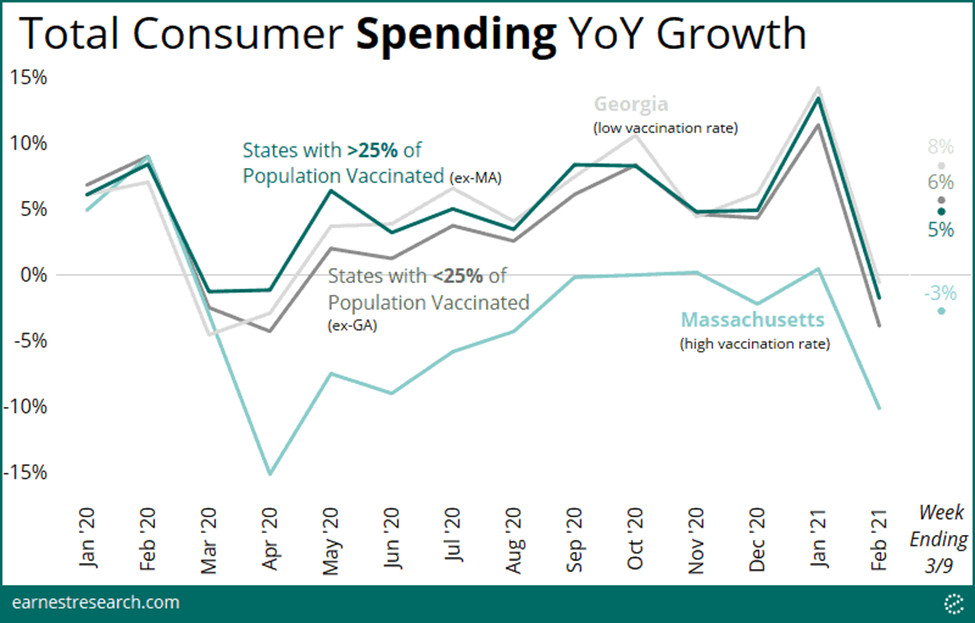image credit: OnTheRoxxBand
Are Vaccinated People Spending Differently than those not Vaccinated?
With over 20% of the U.S. now having received Covid shots (through April 2021), some interesting statistics have been collected on consumer behavior. There is a slow return to pre-Covid era consumer behavior; this suggests industries impacted most by the quarantines still have much more potential. It also reveals that despite the expectations that the vaccine would encourage many people to be out among others for live music, gym workouts, dining, etc., those that are more likely to be out in crowds are those that have not been vaccinated. This reaction has been as hard to predict as everything else over the past year.
Vaccinated Behavior vs. Unvaccinated
According to an April survey by Cardify, the most likely consumers to be out at gyms, restaurants, salons, and entertainment venues are those that have not been vaccinated and don’t plan on getting one. As an explanation as to why those that have received immunities aren’t as likely to be out, Derrick Fung, CEO of Cardify said, vaccinated consumers are “proceeding with cautious optimism.” The vaccinated are slow to behave as they did pre-Covid and are now less comfortable being around large crowds of people.
The Cardify survey data is confirmed by other research conducted by Earnest Research (ER). ER looked at consumer spending and foot traffic across the most and least vaccinated states, along with how well newly acquired customers during COVID have been retained across retailers.
The second report comes to the same conclusion. The vaccine rollouts have not been the big driver of spending outside the home that was expected. Digging deeper to see what is happening, it’s clear the least vaccinated states have experienced the most spending compared to the pre-Covid era. And, states having the most vaccinated have not performed.
For example, Georgia has had the slowest vaccine rollout with just 16% of its population having been “jabbed,” yet the state continues to be an outperformer in total consumer spending and traffic. Massachusetts is the most vaccinated state, with more than 25% of its population having received the precaution, and it is struggling to increase in-person commerce.

Source: earnestresearch.com
Spending
As demonstrated in the chart above, Massachusetts, with its above-average vaccination rate, has seen its year-on-year spending sitting well below a year earlier. The highest performer Georgia tops the rate of the data points even when Massachusetts is removed from the 25% or greater category. The measure of performance of states with less than 25% inoculated with Georgia removed is still much closer to year-ago traffic than the high vaccine state of Massachusetts. One explanation for the data running counter to what one may have expected is the states with the most in-person traffic are those that had fewer restrictions over the past year. Their citizenry has less re-adaption anxiety and is not uncomfortable mixing with strangers.
Curiously, the states with higher vaccination rates outperformed in the middle of 2020, a lead that narrowed at the end of the year before January’s stimulus-driven uptick and February’s post-stimulus drop. Early March saw an acceleration across all states but without any clear signs of outperformance in the most vaccinated states.
Take-Away
Vaccines are not the main economic driver. When it comes to people leaving the perceived protection of their homes to enjoy a show, have their haircut, or enjoy a prepared meal out. What they have become accustomed to may be more telling. For investors, it shows that there is much more potential for increased retail sales for the Covid-recovery stocks such as airlines, restaurants, and gyms. At no place in either the Cardify survey or the Earnest Research report was there a suggestion that the more cautious vaccinated populations would not eventually change over time.
Suggested Reading:

|

|
Is Inflation Going to Hurt Stocks?
|
Long Term Retirement Money and Fledgling Companies
|

|

|
Is it Smart to Avoid Brokers that Sell Order Flow?
|
Are Meme Stocks Improving Flawed Markets?
|
Sources:
https://www.earnestresearch.com/insights/
Stay up to date. Follow us:
 |
 |
 |
 |
 |
 |
Stay up to date. Follow us:
 |
 |
 |
 |
 |
 |

